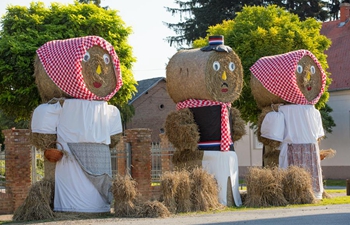WASHINGTON, July 16 (Xinhua) -- Danish and British scientists found that the oldest direct evidence of bread found to date, at least 4,000 years before the advent of agriculture.
A study published on Monday in the journal Proceedings of the National Academy of Sciences reported the charred remains of a flatbread baked by hunter-gatherers 14,400 years ago at an archaeological site in northeastern Jordan.
The findings suggest that bread production based on wild cereals may have encouraged hunter-gatherers to cultivate cereals, thus contributing to the agricultural revolution in the Neolithic period.
A team of researchers from the University of Copenhagen, University College London and University of Cambridge analyzed charred food remains from a Natufian hunter-gatherer site known as Shubayqa 1 located in the Black Desert in northeastern Jordan.
"The 24 remains analyzed in this study show that wild ancestors of domesticated cereals such as barley, einkorn, and oat had been ground, sieved and kneaded prior to cooking. The remains are very similar to unleavened flatbreads identified at several Neolithic and Roman sites in Europe and Turkey," said Amaia Arranz Otaegui, an archaeobotanist from University of Copenhagen and the first author of the study.
"So we now know that bread-like products were produced long before the development of farming," said Otaegui.
According to the researchers, Natufian hunter-gatherers lived through a transitional period when people became more sedentary and their diet began to change.
"Flint sickle blades as well as ground stone tools found at Natufian sites in the Levant have long led archaeologists to suspect that people had begun to exploit plants in a different and perhaps more effective way," said Tobias Richter from University of Copenhagen who led the excavations.
"But the flat bread found at Shubayqa 1 is the earliest evidence of bread making recovered so far, and it shows that baking was invented before we had plant cultivation."
They suggested that the early and extremely time-consuming production of bread based on wild cereals may have been one of the key driving forces behind the later agricultural revolution where wild cereals were cultivated to provide more convenient sources of food.
The charred food remains were analyzed with electronic microscopy at a University College London lab by PhD candidate Lara Gonzalez Carratero.
"The identification of 'bread' or other cereal-based products in archaeology is not straightforward. There has been a tendency to simplify classification without really testing it against an identification criteria. We have established a new set of criteria to identify flat bread, dough and porridge like products in the archaeological record. Using Scanning Electron Microscopy we identified the microstructures and particles of each charred food remain," said Carratero.
"Bread involves labour intensive processing which includes de-husking, grinding of cereals and kneading and baking. That it was produced before farming methods suggests it was seen as special, and the desire to make more of this special food probably contributed to the decision to begin to cultivate cereals," said Dorian Fuller, professor of archaeobotany at University College London.
"All of this relies on new methodological developments that allow us to identify the remains of bread from very small charred fragments using high magnification," said Fuller.

















